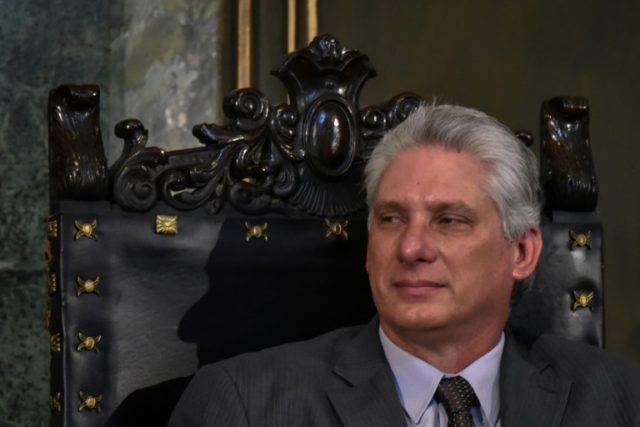Miguel Díaz-Canel, who holds the title of Cuban president but is subordinate to Communist Party leader Raúl Castro, departed Havana Wednesday for a tour of friendly countries, including, most prominently, Russia and China.
Díaz-Canel, whose title grants him the ability to represent the communist government abroad in 87-year-old Castro’s stead, will also visit North Korea, Laos, and Vietnam. At press time, he has landed in Paris for his connecting flight to Moscow.
The Cuban official is expected to seek expanded business and military ties to all four countries. Díaz-Canel will be seeking to sign trade agreements to improve the languishing Cuban economy with Russia and China in particular. Cuba can offer both countries an ally 90 miles from the United States, especially important for China in light of Brazilian President-elect Jair Bolsonaro’s campaigning on diminishing China’s influence on the national economy there. China and Russia both sent high-ranking officials to Venezuela this week to discuss finances.
The trip will be Díaz-Canel’s first since his tour of New York during a visit for the United Nations General Assembly in September.
According to the official newspaper of the Cuban Communist Party, Granma, Raúl Castro personally saw Díaz-Canel off to represent him on the international trip at Havana’s José Martí airport. The president will return to Cuba on November 12 after meeting with Russian President Vladimir Putin, Chinese Communist Party leader Xi Jinping, and North Korean dictator Kim Jong-un, among others. In China, he will visit not only Beijing, but Shanghai, for the China International Import Expo.
“During the visit, the two sides will sign various agreements in the areas of commerce, renewable energy, tourism, technology, and cooperation,” Granma reports.
Díaz-Canel is far from the only world leader to attend the Shanghai expo. According to China’s state-run newspaper, Global Times, the Cuban president will join Dominican President Danilo Medina, Kenyan President Uhuru Kenyatta, Egyptian Prime Minister Mostafa Madbouly, and Pakistani Prime Minister Imran Khan, among others. The presence of the Kenyan president at the event will likely cause turbulence at home, where Kenyans living near and working on Chinese infrastructure projects have accused the communist regime of establishing an “apartheid” system to keep native Kenyans subjugated by Han Chinese immigrants. The Chinese flooding Kenya have also significantly impaired its visa processing and immigration system, according to local reports.
The Chinese Foreign Ministry told reporters Wednesday that Cuba is of “high importance” to China and that Beijing will make several high-ranking officials available to Díaz-Canel in addition to Xi.
“Cuba is the first country in Latin America and the Caribbean to establish diplomatic relations with the People’s Republic of China,” Foreign Ministry spokesman Lu Kang said. “The China-Cuba relationship enjoys a solid foundation, rich dimensions and great vitality, which is running at a high standard and continuously making new progress.”
“We believe that President Díaz-Canel’s visit will further consolidate and strengthen the traditional friendship between China and Cuba and promote new progress in bilateral ties under new historical conditions,” he concluded.
As Russia is the first stop on his trip, Moscow has divulged more details about what to expect from the president’s visit. Kremlin spokesman Dmitry Peskov told reporters Wednesday that the two nations will discuss “tech-military” cooperation in particular, in addition to other potential economic agreements. Russian Deputy Prime Minister Yuri Borisov announced, meanwhile, that Russia and Cuba signed trade deals worth more than $260 million related to energy and infrastructure this week.
“A vast program for future cooperation has been outlined. All projects that we had discussed have a long-term strategic nature and will define the future of the Cuban economy for decades – cooperation in the spheres of energy, industry, healthcare, and agriculture,” Borisov announced, according to Russian news outlet TASS.
On Tuesday, reports suggested that Russia had also agreed to a deal with Cuba to lend the island nation $50 million to buy Russian weapons. While Cuba does not have any ongoing military engagements, tens of thousands of Cuban security agents are currently aiding the socialist Venezuelan regime in torturing and suppressing dissidents. Venezuelan former political prisoner Lorent Saleh, currently in Spain, told the newspaper El Mundo this week that he was held in a sophisticated facility he described as “Russo-Cuban,” where he was subject to a variety of physical and psychological torture methods.

COMMENTS
Please let us know if you're having issues with commenting.